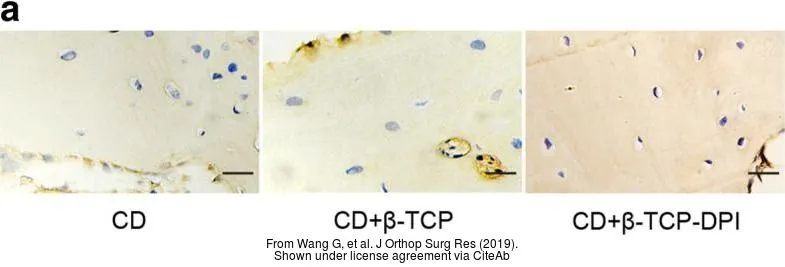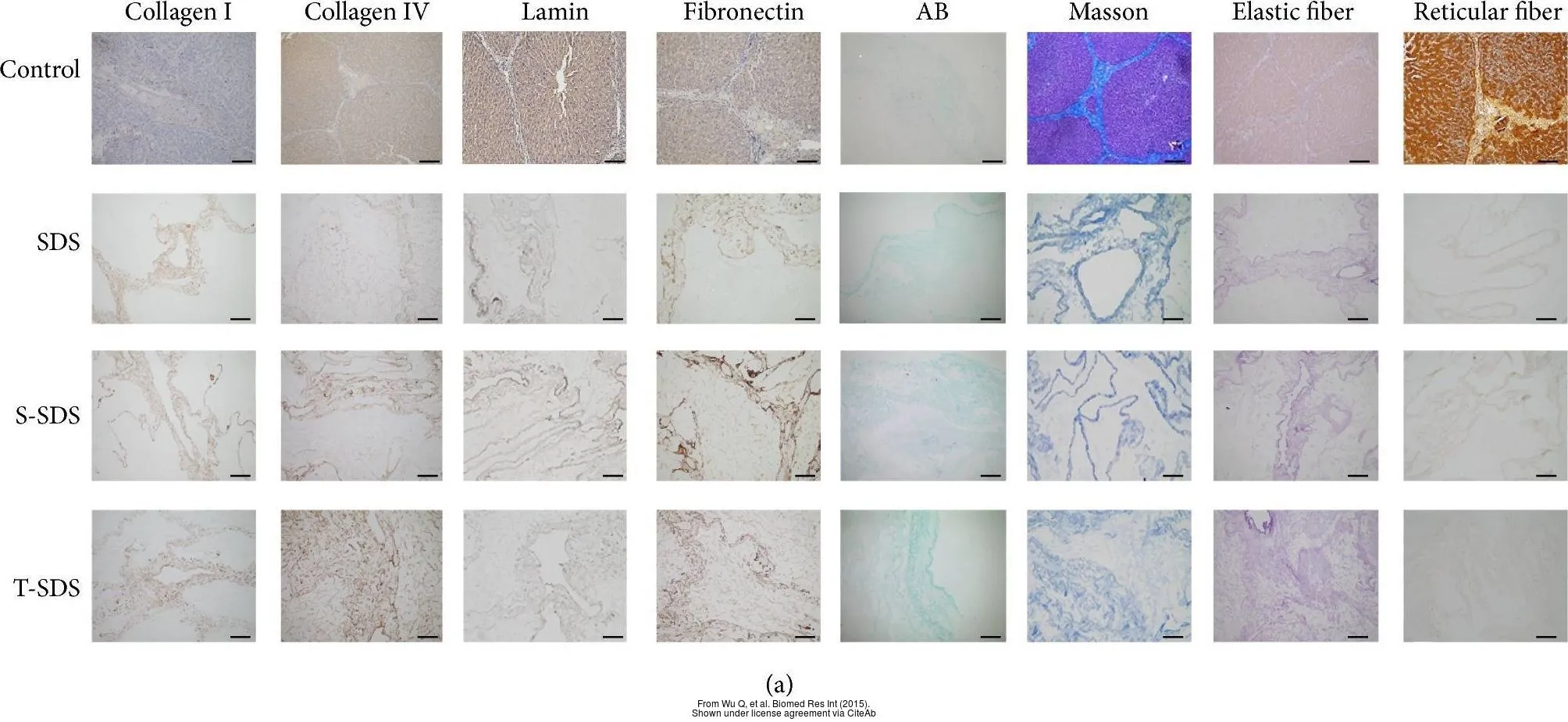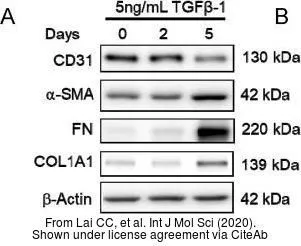![IHC-Fr analysis of human tongue tissue using GTX26308 Collagen I antibody [COL-1] at 1:2,000. IHC-Fr analysis of human tongue tissue using GTX26308 Collagen I antibody [COL-1] at 1:2,000.](https://www.genetex.com/upload/website/prouct_img/normal/GTX26308/GTX26308_20170605_IHC-Fr_w_23060722_261.webp)
IHC-Fr analysis of human tongue tissue using GTX26308 Collagen I antibody [COL-1] at 1:2,000.
Collagen I antibody [COL-1]
GTX26308
ApplicationsDot Blot, ImmunoFluorescence, ImmunoPrecipitation, Western Blot, ELISA, ImmunoCytoChemistry, ImmunoHistoChemistry, ImmunoHistoChemistry Frozen, ImmunoHistoChemistry Paraffin
Product group Antibodies
ReactivityBovine, Deer, Human, Mouse, Porcine, Rabbit, Rat
TargetCOL1A1
Overview
- SupplierGeneTex
- Product NameCollagen I antibody [COL-1]
- Delivery Days Customer9
- Application Supplier NoteIHC-Fr: 1:2000. *Optimal dilutions/concentrations should be determined by the researcher.Not tested in other applications.
- ApplicationsDot Blot, ImmunoFluorescence, ImmunoPrecipitation, Western Blot, ELISA, ImmunoCytoChemistry, ImmunoHistoChemistry, ImmunoHistoChemistry Frozen, ImmunoHistoChemistry Paraffin
- CertificationResearch Use Only
- ClonalityMonoclonal
- Clone IDCOL-1
- ConjugateUnconjugated
- Gene ID282187
- Target nameCOL1A1
- Target descriptioncollagen type I alpha 1 chain
- Target synonymscollagen alpha-1(I) chain, alpha-1 type I collagen, collagen, type I, alpha 1
- HostMouse
- IsotypeIgG1
- Protein IDP02453
- Protein NameCollagen alpha-1(I) chain
- Scientific DescriptionCollagens are highly conserved throughout evolution and are characterised by an uninterrupted Glycine X Y triplet repeat that is a necessary part of the triple helical structure. Type I collagen (95 kDa) is found in bone, cornea, skin and tendon. Mutations in the encoding gene are associated with osteogenesis imperfecta, Ehlers Danlos syndrome, and idiopathic osteoporosis. Reciprocal translocations between chromosomes 17 and 22, where this gene and the gene for Platelet-derived growth factor beta are located, are associated with a particular type of skin tumor called dermatofibrosarcoma protuberans, resulting from unregulated expression of the growth factor.
- ReactivityBovine, Deer, Human, Mouse, Porcine, Rabbit, Rat
- Storage Instruction-20°C or -80°C,2°C to 8°C
- UNSPSC41116161
References
- Manipulation of Glutamatergic Neuronal Activity in the Primary Motor Cortex Regulates Cardiac Function in Normal and Myocardial Infarction Mice.Read this paper
- Immunity-and-matrix-regulatory cells enhance cartilage regeneration for meniscus injuries: a phase I dose-escalation trial.Read this paper
- The matrix microenvironment influences but does not dominate tissue-specific stem cell lineage differentiation.Read this paper
- 1,25(OH)(2)D(3) ameliorates doxorubicin-induced cardiomyopathy by inhibiting the NLRP3 inflammasome and oxidative stress.Read this paper
- Polydopamine-coated biomimetic bone scaffolds loaded with exosomes promote osteogenic differentiation of BMSC and bone regeneration.Read this paper
- Hypoxia Modulates Regenerative Potential of Fetal Stem Cells.Read this paper

![Collagen I antibody [COL-1] detects Collagen I protein at cell membrane by immunohistochemical analysis. Sample: Paraffin-embedded rabbit tongue. Collagen I stained by Collagen I antibody [COL-1] (GTX26308) diluted at 1:200. Antigen Retrieval: Citrate buffer, pH 6.0, 15 min Collagen I antibody [COL-1] detects Collagen I protein at cell membrane by immunohistochemical analysis. Sample: Paraffin-embedded rabbit tongue. Collagen I stained by Collagen I antibody [COL-1] (GTX26308) diluted at 1:200. Antigen Retrieval: Citrate buffer, pH 6.0, 15 min](https://www.genetex.com/upload/website/prouct_img/normal/GTX26308/GTX26308_821905388_20210625_IHC-P_RB_w_23060722_177.webp)
![IHC-Fr analysis of pig tongue tissue using GTX26308 Collagen I antibody [COL-1] at 1:4,000. IHC-Fr analysis of pig tongue tissue using GTX26308 Collagen I antibody [COL-1] at 1:4,000.](https://www.genetex.com/upload/website/prouct_img/normal/GTX26308/GTX26308_20170605_IHC-Fr_1_w_23060722_885.webp)



![Collagen I antibody [COL-1] detects Collagen I protein by immunohistochemical analysis. Sample: Frozen-sectioned mouse kidney. Green: Collagen I stained by Collagen I antibody [COL-1] (GTX26308) diluted at 1:250. Red: Vimentin antibody [HL1506] (GTX636980) diluted at 1:250. Blue: Fluoroshield with DAPI (GTX30920). Collagen I antibody [COL-1] detects Collagen I protein by immunohistochemical analysis. Sample: Frozen-sectioned mouse kidney. Green: Collagen I stained by Collagen I antibody [COL-1] (GTX26308) diluted at 1:250. Red: Vimentin antibody [HL1506] (GTX636980) diluted at 1:250. Blue: Fluoroshield with DAPI (GTX30920).](https://www.genetex.com/upload/website/prouct_img/normal/GTX26308/GTX26308_822403954-1_20251002_IHC-Fr_M_25100823_506.webp)
